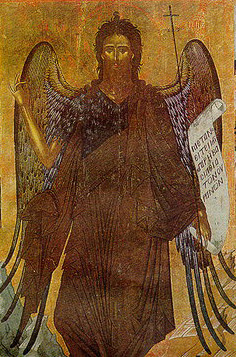Happy Rosh Hashanah!

"Grapes? Figs? Melons? Well, fruit, anyhow..."
By Michael Handelzalts (taken from Haaretz - 10/8/05)
On New Year's eve we tasted a piece of apple after we dipped it in honey, as we are told to do in "Kitsur Shulkhan Aruch," the abbreviated codex of Jewish law, to make our year sweet. And this week, 5766 years ago, during the second week after the creation of the world, "the Lord God planted a garden eastward in Eden; and there he put the man whom he had formed. And out of the ground made the Lord God to grow every tree that is pleasant to the sight, and good for food; the Tree of Life also in the midst of the garden, and the Tree of Knowledge of good and evil ... And the Lord God commanded the man, saying, Of every tree of the garden thou mayest freely eat: But of the Tree of the Knowledge of good and evil, thou shalt not eat of it: for in the day that thou eatest thereof thou shalt surely die." God did not say a word about eating from the Tree of Life.
The snake beguiles Eve to eat from the tree of good and evil by assuring her that she will not die as a result. "She took of the fruit thereof, and did eat, and gave also unto her husband with her." Ibn Ezra writes that after eating from the Tree of Knowledge, "Adam knew Eve his wife," and that means they had intercourse, as that is why it was called "the Tree of knowledge."Post factum, God admits that the snake got it right: "Behold, the man is become as one of us, to know good and evil: and now, lest he put forth his hand, and take also of the tree of life, and eat, and live forever." According to God's intelligent design, two simpletons can live forever - as long as they do not "know" each other and multiply. Had the snake been an honest broker to mankind and not Satan in disguise, he would have beguiled Eve to eat from both trees, starting with the Tree of Life, followed immediately by the Tree of Knowledge.Apples - or notBut which fruit are we talking about? Rashi deduced that as Adam and Eve "sewed fig leaves together, and made themselves aprons" the fruit was a fig, as the tree that was their undoing was their refuge. Ibn Ezra says that had it been a fig, it should have been written that they sewed leaves of the Tree of Knowledge. To which Rashi counters that God did not mention a particular tree by name, as he did not want to shame the tree forever and blame it for being the cause of man's sin. The sages of the Talmud proposed that the fruit could have been a grape, a fig or even wheat.The Latin word for "fruit" in the bible used by Jerome is fructa. The Greek word for "apple" is melon, and the Latin is malum. In the seventh book of "The Aeneid," Vergil writes "et quos maliferea despectant moenia Abellae" about Abella, a town in Campania, being famous for the quality of its apples. Etymologists think that the town's name is the source for the English apple, the German apfel and the Russian jabloko. But no Jewish interpreter of the Bible mentions the apple as the fruit of temptation - although it is considered a symbol of carnal love: "As the apple tree among the trees of the wood, so is my beloved among the sons ... Stay me with flagons, comfort me with apples: for I am sick of love" (Song of Solomon).
In the Avesta, the holy scriptures of the Zaroastrians, the Persian word pairidaeza means "an enclosed garden." This is the source of the Hebrew pardes and the Arabic firdus - orchard. The Greek historian Xenophon was deeply impressed with the Persian walled fruit garden and coined the Greek word paradeisos for it, which served the 70 people translating the Bible into Greek to come up with "the Garden of Eden." St. Jerome in his Latin translation opted for paradises, which in English became "paradise."Eris, the goddess of discord, came uninvited to the wedding of Thetis and Pelleas, the future parents of Achilles, and dropped a golden apple on the wedding feast table, with the inscription kallisti, "to the most beautiful one." The Trojan prince Paris was called to decide which of the three goddesses - Hera, Athena or Aphrodite - deserved to have the apple. He awarded it to Aphrodite, who promised him the love of Helen, wife of Menelaus, the woman who had the face that would launch a thousand ships, to fight the Trojan war.That golden apple earned the sobriquet malum discordia, "the apple of discord." The "good and evil" of the Tree of Knowledge were rendered into Latin as boni and mali. Thus in Christianity the apple became the fruit of discord between man and his maker. "The Fall of Man," a painting by the popular and highly respected Hugo Van Der Goes (1470), depicts an apple tree, with clear detail of both leaves and fruit, in the biblical Garden of Eden complete with Adam and Eve and the Devil. Thereafter, artists everywhere choose apples for the trees in Garden of Eden.
"Kitab al-tuffaha," "The Book of the Apple," is a short text ascribed to Aristotle, but most probably written in Arabic in the 10th century C.E. In 1235 it was translated into Hebrew by Abraham Ibn Hisdai. It is a treatise on death, supposedly dictated by Aristotle as he lay dying. Its Platonic viewpoint, the absence of a Greek version of the text (which was rendered as "Liber de Pomo" into Latin from the Hebrew), and its claim to be "Aristotle's last work" conspired to make it a (relatively) plausible candidate for the one relic that proved Aristotle's final submission to the irresistible charms of Judaism.Aristotle's friends offer to summon a doctor to his bedside, to which he says: "I will disobey the advice of the physician, and will employ no drug but the scent of an apple; which will keep me alive till I have given you the lecture to which you have a right." And by the end of the book the apple falls from his hand and he dies. This anecdote is strangely reminiscent of a midrash about Moses' demise, according to which the patriarch smells an apple before his death, and with its good fragrance his soul departs his body. The Torah is supposed to be a "Tree of Life" to those who follow it. Could it be that the fruit of the Tree of Life was also an apple? Benjamin Franklin quoted in his "Poor Richard's Almanac" the old adage that "an apple a day keeps the doctor away." So, for your very good health, ladies and gentlemen, have an apple!





























0 Comments:
Post a Comment
<< Home